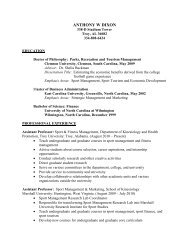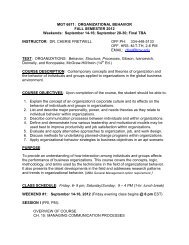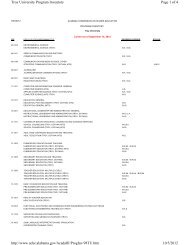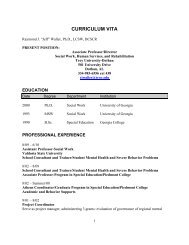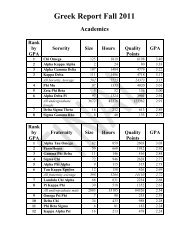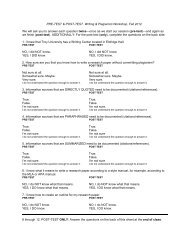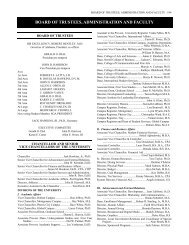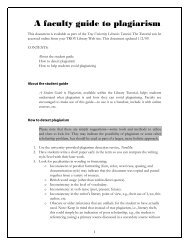TROY Motto, 1887 - Troy University
TROY Motto, 1887 - Troy University
TROY Motto, 1887 - Troy University
Create successful ePaper yourself
Turn your PDF publications into a flip-book with our unique Google optimized e-Paper software.
The <strong>Troy</strong> <strong>University</strong> College of Education<br />
2012<br />
Vol.5<br />
Laying the foundation for tomorrow’s educators<br />
-<strong>1887</strong><br />
Educate the mind to think, the heart to feel, the body to act. ~ <strong>TROY</strong> <strong>Motto</strong>, <strong>1887</strong>
Vikki Kendrick Collins<br />
October 5, 1951 ~ April 15, 2012<br />
By Dr. Trellys Riley<br />
Dr. Vikki Kendrick Collins of Phenix City, Ala., and formerly Manchester, Ga.,<br />
passed away April 15. She was respected by her students, colleagues and friends, as well as<br />
educators across the globe. Dr. Collins was an Associate Professor within <strong>Troy</strong> <strong>University</strong>’s<br />
College of Education on the Phenix City Campus. As a faculty member she was the epitome<br />
of a true professor. She was highly respected within the early childhood education discipline<br />
as a well-published researcher. Her research, in particular on childcare in the American South,<br />
still appears in current early childhood research and practice literature. Dr. Collins maintained a<br />
balance between her research, teaching and service work. On May 20th, the Kappa Delta Pi<br />
students posthumously honored Dr. Collin’s family with the 2012 Outstanding Faculty Award.<br />
The last line on the award appropriately read, “A dedicated educator; a cherished friend.”<br />
From its inception, each year Dr. Collins was instrumental in writing and editing articles<br />
for the Lessons Magazine. For all of these reasons, this issue of The <strong>Troy</strong> <strong>University</strong><br />
College of Education Lessons magazine is dedicated to her memory.
The College of Education<br />
Lessons Magazine<br />
Committee Members<br />
Pamela Arrington, Chair<br />
Lynn Boyd<br />
Robyn Bynum<br />
Dianne Gossett<br />
Cynthia Hicks<br />
Mary Ann Hooten<br />
Dionne Rosser-Mims<br />
Jonathan Taylor<br />
<strong>Troy</strong> <strong>University</strong> is accredited by the Commission on Colleges<br />
of the Southern Association of Colleges and Schools to<br />
award associate, baccalaureate, master’s, education specialist<br />
and doctoral degrees. Contact the Commission on Colleges<br />
at 1866 Southern Lane, Decatur, Georgia 30033-4097 or call<br />
404-679-4500 for questions about the accreditation of <strong>Troy</strong><br />
<strong>University</strong>. The Commission is to be contacted only if there<br />
is evidence that appears to support an institution’s significant<br />
non-compliance with a requirement or standard.<br />
Council for Accreditation of Counseling and Related<br />
Educational Programs (CACREP) - The Master of Science degree<br />
programs in Community Counseling, Clinical Mental Health<br />
Counseling and School Counseling offered at the Phenix<br />
City Campus are accredited by CACREP. The Community and<br />
School Counseling programs at the Montgomery and <strong>Troy</strong><br />
Campuses are accredited by CACREP.<br />
Council on Rehabilitation Education (CORE) - The Master of<br />
Science degree program in Rehabilitation Counseling has joint<br />
CORE accreditation for the Dothan, Montgomery, Phenix City<br />
and <strong>Troy</strong> Campuses.<br />
National Council for Accreditation of Teacher Education<br />
(NCATE) - The Teacher Education Unit at the <strong>Troy</strong>, Dothan,<br />
Montgomery and Phenix City Campuses is accredited by the<br />
National Council for Accreditation of Teacher Education<br />
(NCATE), 2010 Massachusetts Ave., NW, Suite 500, Washington,<br />
DC 20036; phone 292-644-7496. This accreditation covers initial<br />
teacher preparation and advanced education preparation<br />
programs. NCATE is recognized by the US Department of<br />
Education and the Council for Higher Education Accreditation<br />
to accredit programs for the preparation of teachers and other<br />
professional school personnel.
<strong>TROY</strong> THROUGH THE YEARS<br />
1965 <br />
Lessons<br />
The <strong>Troy</strong> <strong>University</strong> College of Education<br />
Laying the foundation for tomorrow’s educators<br />
The first<br />
faculty appointed.<br />
A teaching<br />
center is established<br />
at Maxwell Air Force Base.<br />
<strong>TROY</strong><br />
establishes its first<br />
summer school, called<br />
the Normal Institute.<br />
December 15,<br />
<strong>Troy</strong> State College<br />
officially becomes <strong>Troy</strong><br />
State <strong>University</strong>.<br />
F E A T U R E S<br />
Dean’s Welcome ................................................................ 2<br />
The<br />
Phenix City Campus is<br />
opened as a branch of the<br />
main campus.<br />
College of Education Milestones ......................... 3 - 4<br />
Covington’s Legacy of Mentoring ........................ 5 - 6<br />
<strong>1887</strong> 2004 <br />
1889 <br />
1893 <br />
The school<br />
is renamed <strong>Troy</strong> State t<br />
Normal College.<br />
1924 <br />
KeLeigh Edwards, Miss <strong>TROY</strong> 2012 ................................ 7<br />
1929 <br />
The Normal<br />
College begins using<br />
Kilby Hall on the site of the<br />
current campus in <strong>Troy</strong>.<br />
2009 <br />
1967 Kids as Engineers:<br />
1975 <br />
<strong>Troy</strong> State<br />
<strong>University</strong> becomes<br />
<strong>Troy</strong> <strong>University</strong>.<br />
Dan Caro Presents ............................................................. 8<br />
College of Education<br />
Grants and Contracts ...................................................... 8<br />
Global Campus Students .............................................. 9<br />
Ground is broken<br />
on Bibb Graves Hall.<br />
Jack Hawkins, Jr. Hall<br />
is dedicated.<br />
Old Relationships,<br />
New Opportunities ................................................... 10 - 11<br />
1957 <br />
2012 <br />
10th Annual <strong>TROY</strong> Psychology Conference ......... 12<br />
The State<br />
Board of Education drops<br />
“Teacher’s” from <strong>Troy</strong> State<br />
College’s name.<br />
Wiregrass Math &<br />
Science Consortium<br />
www.troy.edu
Dear Alumni and Friends,<br />
<strong>Troy</strong> <strong>University</strong> celebrated yet another milestone this year, its 125th anniversary. Since its<br />
founding, faculty and staff within the College of Education (COE) have worked to provide<br />
access, training, leadership, advocacy, and service for those interested in professional careers in<br />
education, counseling, interpreter training, and psychology. With this in mind, we agreed that<br />
this issue of the College’s magazine, Lessons, should highlight a few of those contributions to<br />
the continued growth and progress of <strong>Troy</strong> <strong>University</strong>.<br />
In this issue of Lessons, with the very first article and the timeline that runs throughout the<br />
magazine, you will find a summary of some of these significant historical events that aided in the<br />
growth and progress of <strong>Troy</strong> <strong>University</strong> over these last 125 years, especially in the area of grants<br />
and contracts activity. Many of these grants received led to statewide initiatives that provide<br />
continuing development for Alabama teachers.<br />
We are working on many opportunities that will develop in the near future for the College<br />
of Education, but your support as alumni and friends is needed. As in the past four academic<br />
years and again this academic year, the state prorated <strong>University</strong> budgets. We anticipate<br />
additional cuts this coming academic year. Please take this opportunity and support the<br />
<strong>University</strong>’s Building Beyond Boundaries initiatives and specifically the College of Education.<br />
Through your contributions, your College of Education can make a difference in the lives of<br />
both our <strong>University</strong> students and the K-12 students we serve.<br />
It has been my sincere pleasure to work with the COE leadership and faculty as Interim Dean<br />
these past eight months. As the College transitions to new leadership, I expect that the past<br />
legacy of training tomorrow’s education leaders through innovation in teaching and the<br />
ongoing commitment to research and service, will continue in the future.<br />
Dr. Don Jeffrey<br />
Interim Dean,<br />
College of Education<br />
Vice Chancellor<br />
<strong>Troy</strong> <strong>University</strong>, Dothan Campus<br />
SPONSORED<br />
PROGRAMS<br />
THROUGH <br />
THE YEARS<br />
2 www.troy.edu
COLLEGE OF EDUCATION MILESTONES<br />
FROM <strong>1887</strong> TO PRESENT<br />
By Drs. Pamela Arrington and Lynn Boyd<br />
<strong>Troy</strong> <strong>University</strong>’s tradition of teaching excellence<br />
dates to its founding on February 26, <strong>1887</strong>, when an act of<br />
the Alabama Legislature established <strong>Troy</strong> Normal School<br />
as an institution to train teachers for Alabama’s schools.<br />
From its beginnings as a normal school to a global<br />
provider of higher education, <strong>Troy</strong> <strong>University</strong>’s first 125<br />
years have been marked by growth and progress. Faculty,<br />
students, and staff within the College of Education have<br />
been integral contributors to this growth and progress.<br />
This article will highlight key events within the College<br />
of Education that aided this growth and progress over<br />
the years.<br />
During its early years, the Normal School was<br />
administered in conjunction with the City Schools of <strong>Troy</strong>.<br />
These inextricable ties continue today. In exchange for a<br />
tuition-free education, students signed a contract agreeing<br />
to teach in Alabama public schools for a minimum of two<br />
years upon earning their<br />
teacher certification.<br />
In order to strengthen<br />
practice teaching for<br />
pre-service teachers, the<br />
Kilby Hall Laboratory<br />
School began in the<br />
early 1900s. By the 1930s,<br />
the Laboratory School was renowned throughout the<br />
Southeast, especially among elementary teachers for its<br />
role in training pre-service teachers. A name change to <strong>Troy</strong><br />
State Teachers College occurred when the college began<br />
granting degrees in the early 1930s.<br />
~ continued on next page<br />
1991<br />
Discover<br />
Alabama II<br />
MAR<br />
Wiregrass<br />
Writing<br />
Project<br />
OCT<br />
Fund for<br />
Innovation<br />
in Education<br />
DEC<br />
1992<br />
National<br />
Writing Project<br />
MAR<br />
Fantastic Flight<br />
Aerospace Education<br />
Teacher Workshop<br />
JUN<br />
1993<br />
PIIMS<br />
MAR<br />
1994<br />
Science in Motion<br />
Southeast Regional<br />
Scientific Rolling Store<br />
JUL<br />
Educate the mind to think, the heart to feel, the body to act. ~ <strong>TROY</strong> <strong>Motto</strong>, <strong>1887</strong><br />
3
~ continued from page 3<br />
By the late 1930s, not only was the <strong>University</strong> known<br />
for teaching excellence across the Southeast, but also<br />
nationally. The <strong>University</strong> was selected as one of seven<br />
teacher’s colleges to participate in the National Study<br />
of Teacher Education by the Commission on Teacher<br />
Education. At the state level, the College of Education<br />
expanded its curriculum to include the preparation of<br />
junior and senior high school teachers in non-vocational<br />
fields.<br />
The mid-1950s was characterized<br />
by growth and expansion for<br />
<strong>Troy</strong> <strong>University</strong> and the College of<br />
Education. Two key events were<br />
evidence of this period of growth and<br />
expansion. The first event occurred<br />
in 1952 when <strong>Troy</strong> <strong>University</strong> was<br />
selected to participate in a national pilot program preparing<br />
teachers to deal with the topic of religion in the public<br />
schools. Then in 1957, the <strong>University</strong> awarded the first<br />
master’s degree in education.<br />
The theme of growth and expansion was continued<br />
into the next two decades with teaching centers and<br />
branch campuses opening in<br />
new locations across Alabama.<br />
Teaching centers opened at Ft.<br />
Rucker in 1961 and at Maxwell<br />
Air Force Base in 1965. These<br />
teaching centers evolved into<br />
the present day Dothan and<br />
Montgomery campuses. In 1975, the Phenix City Campus<br />
opened as a branch campus. The <strong>University</strong> also sought to<br />
expand degree offerings. In 1964, after being approached<br />
by area schools who needed band directors and music<br />
teachers, the <strong>University</strong> explored the possibility of<br />
creating a bachelor’s degree in music education.<br />
The Alabama Educational Leadership Hall of<br />
Fame was established in 1982 by the Alabama Legislature<br />
to recognize exceptional professionals or citizens for<br />
noteworthy contributions to public education at the<br />
elementary or secondary levels. The Alabama Educational<br />
Leadership Hall of Fame is located in Hawkins Hall on the<br />
<strong>Troy</strong> Campus.<br />
The <strong>University</strong> demonstrated a commitment to<br />
increasing academic standards and strengthening<br />
its ability to produce the highest quality students<br />
by attaining accreditation from the<br />
Council for Accreditation of Counseling<br />
and Related Educational Programs<br />
(CACREP), The Council on Rehabilitation<br />
Education (CORE), and The<br />
National Council for Accreditation of<br />
Teacher Education (NCATE). Counseling<br />
programs (Community Counseling,<br />
Clinical Mental Health Counseling, and<br />
School Counseling) at the Phenix<br />
City Campus were the first to attain<br />
CACREP accreditation in 1999. In 2005, the <strong>Troy</strong> Campus<br />
was awarded CACREP accreditation for the Community<br />
Counseling and School Counseling programs. During the<br />
following year, the Community Counseling and School<br />
Counseling programs received CACREP accreditation<br />
at the Montgomery Campus. The same programs were<br />
accredited by CACREP at the<br />
Dothan Campus in 2009, while<br />
the Southeast Region received<br />
CACREP accreditation fo r t h e<br />
Clinical Mental Health<br />
Counseling program the same<br />
year. In the fall of 2007, the<br />
Rehabilitation Counseling<br />
programs at the four Alabama<br />
campuses received accreditation through CORE. Further<br />
testament to the commitment of producing the highest<br />
quality students was evidenced by NCATE granting full<br />
accreditation status under one umbrella to all four Alabama<br />
campuses in 2008.<br />
1995<br />
Southeast<br />
Alabama Regional<br />
Inservice Center<br />
OCT<br />
1997<br />
EARTH<br />
LAB ‘97<br />
JAN<br />
1998<br />
Preparing the<br />
Learning Disabled for<br />
Higher Education<br />
OCT<br />
Gulf Coast<br />
Conference on the<br />
Teaching of Writing<br />
OCT<br />
1999<br />
Alabama<br />
Reading<br />
Initiative<br />
NOV<br />
2000<br />
Preparing<br />
Tomorrow’s Teachers<br />
Technology College<br />
MAY<br />
4 www.troy.edu
COVINGTON’S LEGACY OF MENTORING<br />
By Dr. Barbara Toner<br />
How, then, do mentors transmit wisdom Most often, it seems, they take us on a journey.<br />
In this aspect of their work, mentors are guides. They lead us along the journey of our lives.<br />
We trust them because they have been there before. They embody our hopes, cast light on the way ahead,<br />
interpret arcane signs, warn us of lurking dangers, and point out unexpected delights along the way.<br />
There is a certain luminosity about them, and they often pose as magicians in tales of transformation,<br />
for magic is a word given to what we cannot see—and we can rarely see across the gulf.<br />
As teachers of adults, we have much to learn from the mythology of the mentor.<br />
~ Daloz, pp. 18 & 19<br />
Auvronette Guillbeaux of <strong>TROY</strong>’s Covington, Ga. location, (pictured with Dr.<br />
Barbara Toner) receives the 2012 ‘Adjunct Instructor of the Year Award’.<br />
As instructors at <strong>Troy</strong> Global Campus, we have the<br />
privilege of working with adult learners, many of whom<br />
enter with feelings of inadequacy and anxiety, yet come<br />
to us with hope to obtain something they have missed –<br />
a college education. Many of them have sent their own<br />
children to college or currently have children in college,<br />
but have felt unworthy to take the same path. It is up<br />
to us, not only to offer them academic understandings,<br />
but to see the promise in each of them; and more<br />
importantly, to help them see it, too. If we can succeed<br />
in that task, if we can light the way for them to succeed,<br />
we find that many of them go on to further their<br />
education in their chosen field of study. We are not only<br />
instructors, but guides on their journey through life, and<br />
like the Statue of Liberty, we too lift our lamps before<br />
the golden shore of a better tomorrow. The journey of<br />
one such student comes to mind: Auvronette Guillbeaux.<br />
~ continued on next page<br />
Pathways<br />
Workshops<br />
JUN<br />
Reading<br />
Specialist<br />
AUG<br />
2001<br />
Education & Human Resources<br />
Directorate Education<br />
Development Center<br />
JUL<br />
Collaborative Teacher<br />
Certification Program<br />
JUL<br />
Technology<br />
in Motion<br />
JUL<br />
Governor’s<br />
Child Day Care<br />
Safety Grant<br />
OCT<br />
Wiregrass<br />
Math and Science<br />
Consortium<br />
OCT<br />
Educate the mind to think, the heart to feel, the body to act. ~ <strong>TROY</strong> <strong>Motto</strong>, <strong>1887</strong><br />
5
Tell me, I forget.<br />
Show me, I remember.<br />
Involve me, I understand.<br />
~ continued from page 5<br />
I first met Auvronette in Term 4/2007 when she<br />
registered for PSY 6648 Theories of Personality. She<br />
was a working mother of a teenager, had completed<br />
her undergraduate degree in human services, had<br />
co-authored an anger management manual, and had<br />
experiences in both voluntary and paid employment in<br />
serving her community in many ways. Yet, she wanted<br />
more. I had the good fortune of teaching Auvronette<br />
for six of her graduate courses (MSPSE/Psychology) and<br />
I became her mentor; we shared altruistic values and<br />
societal concerns. I had the opportunity to really know<br />
Auvronette - her aspirations, her fears, her values, and<br />
her goals. Her background included a strong interest<br />
in Christian counseling and a commitment to service.<br />
The more she studied psychology, the more she<br />
was determined to become a Licensed Professional<br />
Counselor (LPC).<br />
After graduating with a 4.0 GPA, Auvronette<br />
enrolled in a graduate counseling program. The<br />
more I knew her, the more I wanted our undergraduate<br />
students to know her as their instructor and as one<br />
of their mentors. She had walked that path on which<br />
they too now walked, and she was credible to them.<br />
She became certified to teach several courses in our<br />
undergraduate program, and continues to do that<br />
even today as she pursues her academic goals. In 2012,<br />
Auvronette was given the Adjunct Instructor of the<br />
Year Award at <strong>Troy</strong>/Covington and is fulfilling some of<br />
her “promise.”<br />
By continuing our collaborative relationship with<br />
each other, her goal changed and she decided that<br />
while she couldn’t become a “Dr. T.,” she could become<br />
a “Dr. G.” by being true to herself and developing her<br />
own teaching and mentoring style.<br />
One day, she came to visit and said, “Dr. T., I have<br />
found my passion.”<br />
“Counseling,” I assumed.<br />
“No,” she said. “I want to teach psychology at the<br />
college level and continue doing counseling as a second<br />
career so that I have experience ‘in the trenches’ and<br />
can bring my teaching psychology to our students’ real<br />
life experiences.”<br />
When asked what challenges at <strong>Troy</strong> <strong>University</strong><br />
had contributed the most to her growth through her<br />
Global Campus journey, she responded by saying:<br />
being challenged to become increasingly<br />
self-aware<br />
gaining self-confidence through constant<br />
motivation<br />
growing through many red marks on my<br />
papers until I mastered the task<br />
thinking critically through questions posed<br />
by Dr. T., which required me to be mindful<br />
and thoughtful as well as engaging,<br />
both in verbal and written expression<br />
Auvronette describes our mentoring relationship<br />
from her perspective by saying, “You, absolutely 100% of<br />
the time, meet and accept students exactly where they<br />
are. From there, you make an assessment without that<br />
student feeling demeaned or reduced; in fact, in your<br />
presence, they feel empowered.” From my perspective,<br />
I describe it as a reciprocal relationship; I learn and<br />
grow as much through this guiding journey as she does.<br />
Auvronette’s past and present continue to<br />
be tied to <strong>TROY</strong>. She continues to be an alumna and a<br />
teaching mentor through Global Campus, while pursuing<br />
her doctorate in counseling and supervision. We sincerely<br />
hope her future will see “Dr. G” as a full-time Global<br />
Campus faculty member.<br />
There is a wall hanging outside my office door, an<br />
ancient Chinese Proverb:<br />
Tell me, I forget.<br />
Show me, I remember.<br />
Involve me, I understand.<br />
Auvronette adds, “Through that understanding, I<br />
grow and I contribute, and I am able to return, in some<br />
small measure, that which I have gained through my<br />
alma mater.”<br />
2002<br />
Science<br />
Laboratory Safety<br />
CD-ROM Training<br />
FEB<br />
Counselor and<br />
Administrative<br />
Service Net<br />
MAY<br />
Making Teachers<br />
Leaders Effective in<br />
Reading Instruction<br />
JUN<br />
National Board<br />
Professional Teaching<br />
Standard<br />
JUL<br />
Gulf Coast<br />
Conference on the<br />
Teaching of Writing<br />
OCT<br />
Teacher Recruitment<br />
Grant Partnership Assistance in<br />
Growing Educators (PAIGE)<br />
OCT<br />
6 www.troy.edu
KeLeigh Edwards, Miss <strong>TROY</strong> 2012<br />
By Dr. Pat Warren<br />
KeLeigh Edwards, Miss<strong>TROY</strong> 2012, has discovered<br />
two things that she is enthusiastic about: children<br />
and education.<br />
The daughter of Charles and Lenita Edwards, the<br />
Elementary Education major was born in Columbus,<br />
Ga., but presently lives in Smith Station.<br />
She states that an emphasis on education has<br />
always been a part of her life. Having graduated from<br />
a small school, KeLeigh stated that <strong>Troy</strong> <strong>University</strong> has<br />
been a blessing to her. “<strong>TROY</strong> has allowed me to be<br />
exposed to various international people and cultures.”<br />
Through these experiences she has developed a<br />
deeper respect for people and their beliefs.<br />
KeLeigh’s platform as Miss <strong>TROY</strong> is “Volunteerism:<br />
Giving the Gift of Time.” She stated that volunteering<br />
“allows a person to learn about themselves. All people,<br />
regardless of age, can find some way to help others.”<br />
Being Miss <strong>TROY</strong>, KeLeigh wanted to find<br />
something that would promote the university.<br />
It was through a class on children’s literature that<br />
she realized that writing a children’s book about the<br />
university might provide that avenue.<br />
Along with her art teacher, Pam Oglesby, KeLeigh<br />
composed a children’s book entitled “T-Roy Lends A<br />
Hand.”<br />
<strong>TROY</strong> fans might catch a glimpse of KeLeigh<br />
passing out copies of her book to children who<br />
attend sporting events.<br />
KeLeigh Edwards reads her book,<br />
“T-Roy Lends A Hand,” to elementary<br />
school children in Smith Station, Ga.<br />
2003<br />
Statewide<br />
Kindergarten Training<br />
(ARFI)<br />
MAR<br />
2004<br />
Improving Teacher<br />
Quality: Mastery of<br />
Content Teaching<br />
Writing<br />
JAN<br />
Alabama<br />
Reading<br />
Academy<br />
MAY<br />
Leadership<br />
for Learning<br />
Institute<br />
OCT<br />
Improving<br />
Math Achievement<br />
in Grades 7-8<br />
OCT<br />
2005<br />
Planning Grant Proposal:<br />
Secondary Collaborative Teacher<br />
Education Program<br />
MAR<br />
Educate the mind to think, the heart to feel, the body to act. ~ <strong>TROY</strong> <strong>Motto</strong>, <strong>1887</strong><br />
7
Dan Caro<br />
Presents at the 17 th Annual<br />
Helen Keller Lecture Series<br />
By Dr. Mary Ann Hooten<br />
The 17 th Annual Helen Keller Lecture Series took place in<br />
April 2012 at <strong>Troy</strong> <strong>University</strong> on the <strong>Troy</strong>, Ala., campus. Dr. Mary<br />
Anne Templeton, Associate Professor in the Department of<br />
Counseling and Psychology, has served as the Chair of the Planning<br />
Committee for this event for the past three years. This year,<br />
she was assisted by Dr. Barbara Lyons, who will be the Chair<br />
for next year’s event. According to Dr. Templeton, “Dr. and Mrs.<br />
Hawkins started the Helen Keller Lecture Series to help educate<br />
students and the community about people with disabilities<br />
who have overcome obstacles.”<br />
This year’s speaker was Dan Caro, a remarkable individual<br />
who is certainly familiar with what it takes to overcome<br />
obstacles in his own life. When Mr. Caro was only two years old,<br />
he was severely burned in a gasoline explosion in his family’s garage.<br />
The accident left him with third degree burns over most<br />
of his body. He also lost both of his hands and most of his face.<br />
He suffered through years of excruciating surgeries and was<br />
ostracized by many people in his hometown in Louisiana.<br />
Through sheer determination, he not only survived but has followed<br />
his dream of becoming an accomplished drummer in<br />
New Orleans. His amazing story and philosophy of life serve as<br />
a testament that anyone can rise above life’s setbacks, no matter<br />
how overwhelming they may seem.<br />
Dan Caro<br />
performs at<br />
Claudia Crosby<br />
Theater on<br />
<strong>Troy</strong> Campus.<br />
Dan Caro is one of many great speakers who have presented<br />
at the Helen Keller Lecture Series over the years. Other notable<br />
speakers include Heather Whitestone, Patty Duke, Radio and his<br />
coach, and Senator Howell Heflin.<br />
According to Dr. Templeton, several organizations<br />
collaborate to host the lecture series each year. In addition to<br />
<strong>Troy</strong> <strong>University</strong>, the co-sponsoring agencies include The Alabama<br />
Institute for the Deaf and Blind, Alabama State Department of<br />
Education, Alabama Department of Rehabilitation Services, and<br />
The Helen Keller Foundation for Research and Education.<br />
For more information on Dan Caro, please visit<br />
www.dancaro.com.<br />
College of Education Grants and Contracts 1991-2012<br />
By Dr. Cynthia Hicks<br />
Over the years, the faculty and staff of <strong>Troy</strong> <strong>University</strong> have sought external support for research and creative projects. Over<br />
$100 million in external funding has been generated to date. The Office of Sponsored Programs, established in 1991, serves as the<br />
single point of contact to facilitate principal investigators from project inception to closing of a funded grant or contract.<br />
Outreach through faculty grant projects is an act of faculty scholarship that can take many forms. Some faculty grant<br />
projects are individual, such as the Fulbright Scholars Program. Other forms of outreach, such as conferences, short courses,<br />
institutes, research-centered projects, program development, candidate course and degree completion support, K-12 school<br />
community interventions, program development, and community partnerships are large-scale, such as Science in Motion and<br />
the Alabama Math, Science, and Technology Initiative (AMSTI). Funding from these external grants, partnerships, and contracts<br />
allows faculty members to offer services to reach new audiences, explore new research questions, and provide their expertise to<br />
communities that can benefit from their work as they carry out the mission of the College of Education.<br />
Faculty experts are the heart of these external research and creative outreach projects. In the development of these<br />
grants and contracts, they establish the goals, set the tone, and design the activities to meet the needs of participants.<br />
You will find featured grants and contracts awarded over the last two decades in the “College of Education Milestones<br />
Timeline” in this issue of Lessons magazine.<br />
2005<br />
Conversational<br />
Spanish<br />
MAY<br />
Counselor<br />
and Administrative<br />
Service Net<br />
OCT<br />
Rehabilitation Training –<br />
Long Term Voc. Rehab<br />
Counseling<br />
OCT<br />
Alabama Consortium<br />
Special Education Degree<br />
Certification<br />
OCT<br />
Alabama Math, Science<br />
and Technology Initiative<br />
(AMSTI)<br />
OCT<br />
Science in Motion -<br />
Physics, Biology<br />
OCT<br />
8 www.troy.edu
Global Campus Students~<br />
Reaching New Heights<br />
By Dr. Sharon Thompson<br />
The Great Wall, the Forbidden City, the Temple of<br />
Heaven — these are places we have heard about all of our<br />
lives. Graduate Counseling and Psychology students from<br />
Pensacola and Orlando, Fla., had the opportunity to visit<br />
these famous Chinese sites this summer as part of a joint<br />
study abroad program with the <strong>Troy</strong> Confucius Institute.<br />
Students toured Beijing and had the opportunity to<br />
interact with Chinese university students to get a glimpse<br />
of the counseling and psychology field in China.<br />
Students taught at Chinese middle schools and<br />
were involved in other academic and cultural exchange<br />
activities. In their time in China, students were preparing<br />
EFL (English as a Foreign Language) presentations on<br />
topics that were of interest to Chinese students. They<br />
used activity-oriented teaching methodologies, changing<br />
activities during their presentations every five to seven<br />
minutes. Many students included games, art activities,<br />
role-play, and drama in their presentations. These are all<br />
relatively new to Chinese educators who have traditionally<br />
used only rote learning.<br />
Students also looked forward to learning from<br />
Chinese students about family values, work ethic, and<br />
the now famous “Chinese Tiger Mom” style parenting<br />
phenomena, which has made such a sweeping impact<br />
upon American pop psychology. Drs. Sharon Thompson<br />
and Linda Vanderbleek, who accompanied the students,<br />
lectured at Hubei Normal <strong>University</strong> on Health, Wellness,<br />
and Stress Management.<br />
With the strong support of Dr. Carol Lewis, program<br />
coordinator of Counseling and Psychology, Global<br />
Campus, Southeast Region, <strong>TROY</strong> students had an<br />
unforgettable Chinese experience!<br />
Left to right:<br />
Dr. Sharon Thompson,<br />
Allison Raghianti,<br />
Tina Beshers (seated),<br />
Woody Woodall,<br />
Cierra Williams,<br />
Kristine Simpkins,<br />
Kellie Coyle.<br />
2006<br />
National Assessment<br />
of Educational Progress<br />
in Mathematics (NAEP)<br />
OCT<br />
2007<br />
Comp II:<br />
Comprehension and<br />
Composition<br />
JAN<br />
Burnout<br />
Among Mental<br />
Health Counselors<br />
MAR<br />
Think!!<br />
Write!! Dothan<br />
MAY<br />
Deaf<br />
Interpreter<br />
Program<br />
OCT<br />
Principal<br />
Preparation<br />
Program<br />
OCT<br />
2008<br />
Collaborative in<br />
Secondary Teacher<br />
Education Program<br />
JAN<br />
Educate the mind to think, the heart to feel, the body to act. ~ <strong>TROY</strong> <strong>Motto</strong>, <strong>1887</strong><br />
9
By Dr. Jonathan Taylor<br />
The Army Education Center (pictured)<br />
on the U.S. Army base at Fort Rucker<br />
later became the Dothan Campus for<br />
<strong>Troy</strong> <strong>University</strong>.<br />
In the year 1965, <strong>Troy</strong> <strong>University</strong>, known at the<br />
time as <strong>Troy</strong> State College, began offering courses in<br />
Montgomery, Ala., at Maxwell Air Force Base, home<br />
of The Air <strong>University</strong>—the intellectual and leadership<br />
center of the United States Air Force. What began<br />
as a few courses offered at a military base grew and<br />
developed into <strong>Troy</strong> State <strong>University</strong> Montgomery<br />
(TSUM), and then into the present day Montgomery<br />
Campus. The nature of this event was not singular<br />
for <strong>TROY</strong>, in fact it followed after a similar effort at<br />
Fort Rucker, a United States Army base located near<br />
Dothan, Ala., which later became the Dothan Campus.<br />
Through the years, <strong>Troy</strong> <strong>University</strong> has continued<br />
to develop and maintain a variety of programs in<br />
affiliation with, and support of, the U.S. military.<br />
<strong>TROY</strong> was an original “sweet 16” partner in the Navy<br />
College Distance Learning Partnership (NCDLP), and also<br />
partners in distance learning with the Army through<br />
GoArmyEd, and two of the Air Force’s specialized<br />
education initiatives – the General Education Mobility<br />
initiative (GEM), and the Air <strong>University</strong> Associate to<br />
Bachelor Co-operative (AU-ABC).<br />
One could infer any number of things about the<br />
<strong>University</strong> in light of these early efforts, not least among<br />
them is the innovative approach and broad vision that<br />
have been a part of <strong>TROY</strong> from the very beginning. One<br />
of the more meaningful reasons for revisiting these<br />
historical events, is to remind ourselves of the strong<br />
heritage we have as an academic institution; of being a<br />
military-friendly place of learning.<br />
Like all relationships, maturity<br />
brings change. The relationship between<br />
<strong>Troy</strong> <strong>University</strong> and Maxwell Air Force<br />
Base is no exception. As world events in<br />
recent years have increased the burden<br />
of nearly everyone, particularly those<br />
involved with our national security, it has<br />
become increasingly difficult to navigate<br />
the ever-increasing security policies,<br />
and ensure our students ease of access<br />
on the base. Because of this, and despite<br />
efforts on both sides to facilitate these needs as long<br />
as possible, it has become necessary to move our courses<br />
off the base, and fully onto the Montgomery Campus.<br />
In 1974, <strong>TROY</strong>’s first international<br />
sites were established in Europe in<br />
contract with the U.S. Air Force.<br />
2008<br />
Alabama<br />
Teacher Mentoring<br />
Program<br />
FEB<br />
ACCESS -<br />
Alabama Connecting<br />
Classrooms, Educators &<br />
Students Statewide<br />
SEP<br />
2009<br />
Revitalizing Civics,<br />
Government and<br />
Economics in Southeast<br />
Alabama Schools<br />
FEB<br />
Building<br />
Educational<br />
Partnerships<br />
JUN<br />
Child<br />
Mental Health<br />
Initiative<br />
OCT<br />
Ignite and Excite:<br />
AESP Support for the<br />
Wiregrass Math & Science<br />
Consortium<br />
OCT<br />
10 www.troy.edu
While this<br />
logistical necessity<br />
may be viewed,<br />
understandably,<br />
with certain<br />
sadness by some<br />
who see it as the<br />
end of an era, it<br />
needn’t be viewed<br />
that way.<br />
Many of the graduate programs at the Montgomery<br />
Campus have a steady flow of Airmen (the USAF’s official<br />
term for both men and women of any rank—officer or<br />
enlisted—and USAF civilians) enrolled in their classes. This<br />
is particularly true in the Adult Education program. The<br />
service men and women stationed at Maxwell, often for<br />
no more than three years, continue to be vital to the life<br />
and vibrancy of our Master of Science in Adult Education<br />
(MSADE) program. Our relationship with the base is thriving<br />
in many ways in addition to the involvement of these<br />
students in our program, and some of our adjunct faculty<br />
work in a full-time capacity at the base as well.<br />
Most recently, I have been working with officials<br />
at the Squadron Officer School (SOS), a Professional<br />
Military Education course for junior officers held by the<br />
Squadron Officer College (SOC) of The Air <strong>University</strong>, to<br />
conduct research and scholarship. During the past year,<br />
and continuing in the present, the officials there have been<br />
extremely open and helpful in assisting me as I advance my<br />
own workplace learning scholarship (learning resistance<br />
and conceptual change) as well as, hopefully, assisting the<br />
SOS to continue to be innovative as they serve their own<br />
students. This relationship is still somewhat new but, again,<br />
not a singular event as there have been others before me<br />
to do the same.<br />
While the focus here has been a Montgomery campus<br />
and a Montgomery military base, the relationships represented<br />
are indicative of a larger, even more meaningful<br />
heritage. <strong>Troy</strong> <strong>University</strong> is presently involved, in one capacity<br />
or another, with 31 military bases around the world.<br />
Like all relationships there is responsibility for all those<br />
involved. Ours is to remember, as times continue to change<br />
and our great university continues to mature, that those in<br />
the military, in addition to being defenders of our freedom,<br />
heroes, and loyal servants, are also lifelong learners, and we<br />
will always welcome them to the mighty walls of <strong>TROY</strong>.<br />
Dr. Taylor (left)<br />
conducts a<br />
Professional<br />
Military<br />
Education course<br />
at the Squadron<br />
Officer School in<br />
Maxwell, AL.<br />
2010<br />
Developing<br />
Historical Inquiry with<br />
Primary Sources and<br />
Oral Histories<br />
JAN<br />
Using Documents to<br />
Develop Historical Thinking:<br />
A Statewide Initiative<br />
JAN<br />
Helen Keller<br />
Lecture Series<br />
APR<br />
Camp Project Citizen:<br />
A Summer School<br />
Initiative<br />
JUN<br />
Fulbright-Hays<br />
Seminars Abroad<br />
Program<br />
JUN<br />
Enhancing We the People<br />
Curriculum with Library of<br />
Congress Primary Sources<br />
JUL<br />
Educate the mind to think, the heart to feel, the body to act. ~ <strong>TROY</strong> <strong>Motto</strong>, <strong>1887</strong><br />
11
Students and Faculty Present<br />
Research at the 10 th Annual <strong>Troy</strong> <strong>University</strong><br />
Psychology Conference<br />
By Dr. Mary Ann Hooten<br />
The Annual <strong>Troy</strong> <strong>University</strong> Psychology Conference<br />
continues to grow and, in its tenth year, attracted more<br />
participants than ever. The Psychology Conference<br />
started on the <strong>Troy</strong>, Ala., campus in the 2002-2003 academic<br />
year as an opportunity for undergraduate students<br />
in psychology to present original research that was<br />
conducted as part of their Experimental Psychology<br />
course. Since that time, the conference has expanded<br />
to include presentations by undergraduate and graduate<br />
students in psychology, counseling, and related disciplines,<br />
as well as faculty research. The participants in the<br />
conference came from several regional universities and<br />
many of the <strong>Troy</strong> <strong>University</strong> campuses.<br />
Over 200 people attended the 10 th Annual <strong>Troy</strong><br />
<strong>University</strong> Psychology Conference held in April, 2012.<br />
This year’s conference featured 35 paper presentations<br />
and 51 poster presentations on a variety of topics related<br />
to the field of psychology. In addition to the paper and<br />
poster presentations, undergraduates get the chance to<br />
compete in a “Psychology Jeopardy” quiz contest to test<br />
their knowledge of the subject matter. Prizes are awarded<br />
for the best undergraduate papers and posters, and the<br />
Jeopardy winner.<br />
The key note speaker this year was Mr. Jeremy<br />
Rakes, who is a substance abuse counselor with Bradford<br />
Health Services in Warrior, Ala. His presentation<br />
addressed the rewards and challenges associated with<br />
working in the field of addiction treatment. He also provided<br />
career advice for students who might be interested<br />
in pursuing a career in substance abuse counseling.<br />
Mandy Colburn, Psychology Undergraduate Student, <strong>Troy</strong> Campus.<br />
In addition to Mr. Rakes, the conference also featured<br />
a special guest speaker, Dr. Roberto Rodriguez from the<br />
Universidad de Iberoamerica in Costa Rica. Dr. Rodriguez<br />
presented information about an exciting opportunity<br />
for psychology and counseling students to study abroad<br />
in Costa Rico in May 2013. For more information about this<br />
study abroad opportunity, contact Dr. Gina Mariano at<br />
gjmariano@troy.edu.<br />
Overall, the <strong>Troy</strong> <strong>University</strong> Psychology Conference<br />
continues to gain popularity and participation. According<br />
to Dr. Frank Hammonds, Associate Professor in the<br />
Department of Counseling and Psychology and Co-Chair<br />
of the conference, “The main goal of the conference is to<br />
promote student research. This was our biggest conference<br />
yet. We had many excellent presentations and posters.”<br />
For information about the 2013 conference or to submit<br />
a proposal, please visit the conference website at www.troy.<br />
edu and search for Psychology Conference.<br />
2010<br />
eLearning for<br />
Educators and<br />
Education<br />
Technology<br />
OCT<br />
A Multi-Campus<br />
Approach to Rehabilitation<br />
Counseling Education<br />
OCT<br />
2011<br />
Summer of<br />
Innovation<br />
JUN<br />
Summer<br />
Spectacular<br />
& Girls Inc.<br />
JUN<br />
Sustaining<br />
Project Citizen<br />
in Alabama<br />
SEP<br />
2012<br />
Kids as Engineers:<br />
Wiregrass Math &<br />
Science Consortium<br />
APR<br />
12 www.troy.edu
College of Education<br />
Jack Hawkins, Jr. Hall<br />
<strong>Troy</strong>, AL 36082-0001<br />
Presorted Standard<br />
U.S. Postage<br />
PAID<br />
Norfolk, VA<br />
Permit # 1048<br />
FPO<br />
<strong>Troy</strong> <strong>University</strong> and the College of Education<br />
are always interested in recruiting quality<br />
students. If you know of a prospective student,<br />
or are interested in exploring what degree<br />
opportunities are available at <strong>TROY</strong>, please<br />
<br />
or visit us at our website, mytroyu.me, and<br />
click on Prospective Students.<br />
www.troy.edu



